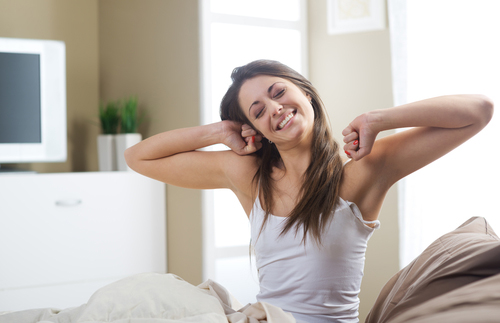
Leading the Way to Larkdom
5 Steps to Become More of an Early Bird
By Natalie Kaar
Want to reap some of the benefits associated with being an early riser? Read this before resetting that alarm.
1Prior to going to bed, consider taking the hormone melatonin. Eberly recommends melatonin as it promotes going to sleep at the right time and helps to consolidate sleep.
2Apply the rules of proper sleep hygiene. For instance, Eberly cautions us to avoid stimulants such as caffeine in the afternoon or evening and to avoid alcohol within three to four hours of bedtime. Stein also advises stopping screen time at least an hour before bedtime and spending some time writing down concerns and a schedule for the next day prior to going to bed. He says, “This allows a person to relax better in the bedroom and takes some of the potential tension out of trying to go to sleep.”
3If you wish to phase advance your sleep schedule, do so gradually. Breus advises getting your new wake-up time set immediately, but moving your bedtime up by about 30 minutes only as often as every three days. Once your schedule allows for adequate sleep, he says stick to it. Go to bed at the same time and wake up at the same time every day, including weekends.
4Include bright light in the morning when you wake up; likewise, minimize light exposure in the late evening and while asleep. Eberly says to open the shades and turn on the lights when you rise. And Stein mentions, “There are light panels triggered by a timer or a ‘dawn simulator’ alarm clock that can expose an individual to 10,000 lux of light, similar to sunlight in the early morning, in an effort to change a person’s intrinsic biological clock.”
5Realize that you don’t have full control over your sleep cycle. As Dr. Stein mentions, “Circadian rhythms refer to a person’s own intrinsic biological day-night cycle, but a person’s sleep cycle is affected by both internal and external factors.” He explains, “A person can enjoy the quiet time in the evening when his or her kids or spouse are asleep and want to go to sleep later. A different person may like to get up early to exercise or prepare for the day ahead. This is why in order to change someone’s circadian rhythm, it requires a firm commitment from the individual to do so.”
Age is one factor. Dr. Breus explains, “In adolescents, we tend to see them phase delay, or want to go to bed later and wake later. Then [their sleep cycle] seems to go more toward whatever their genetic propensity may be. Then as they get past [age] 55-60, we see them phase advance and get earlier.”
Early Riser Guide
(January 2015)
